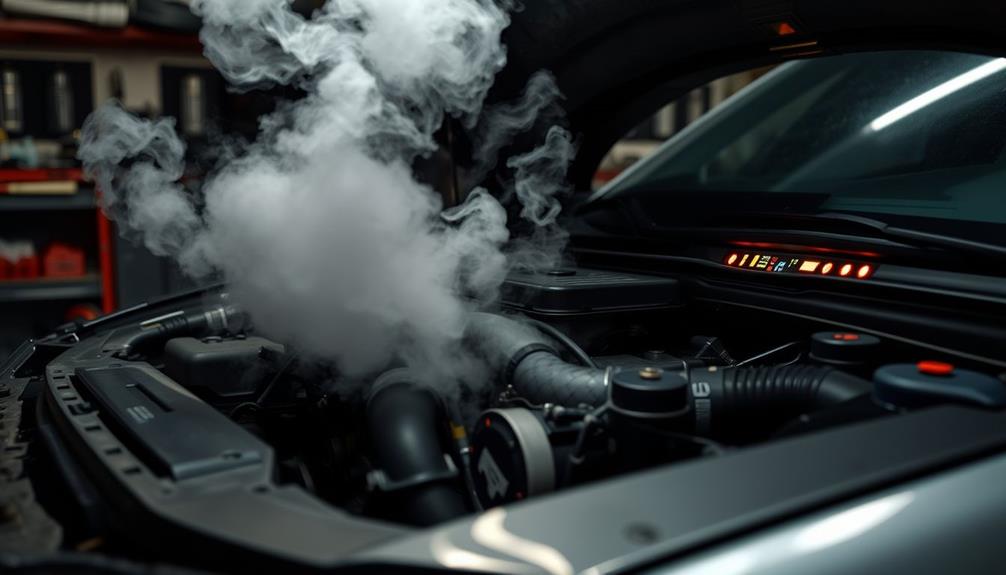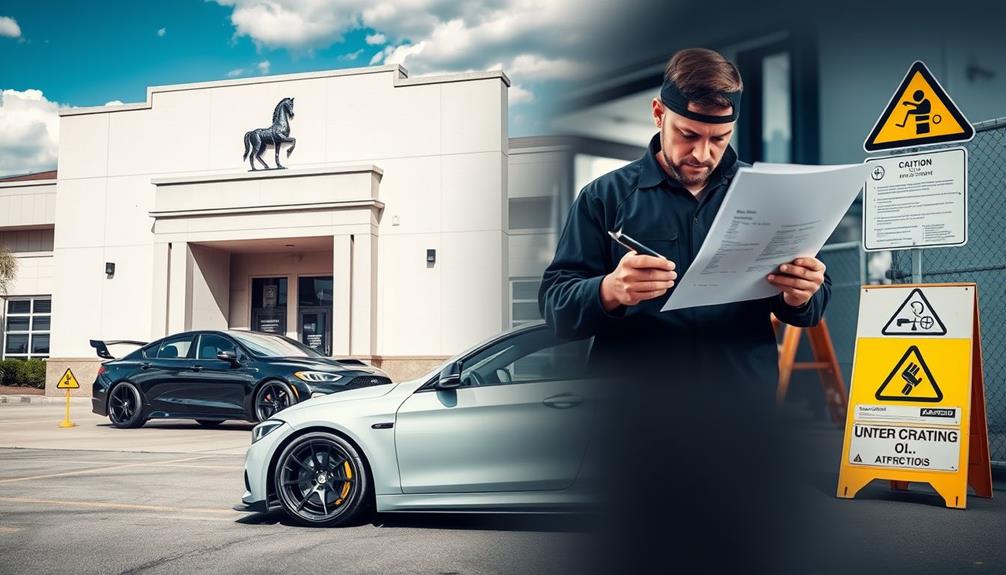Car tuning can greatly enhance your vehicle's performance, boosting horsepower and improving fuel efficiency, but it isn't without drawbacks. You might enjoy quicker acceleration and a more personalized look, but modifications can void your warranty and may lead to increased wear on parts. Upfront costs range from $300 to over $3,000, plus you may face higher maintenance expenses down the road. Additionally, some modifications could put you at odds with emissions regulations. It's crucial to evaluate these pros and cons to make an informed decision about whether tuning is right for you. There's more to reflect on as you explore your options. You should also consider the long-term impacts on resale value and potential insurance rate increases. On the other hand, a career in car tuning can be financially rewarding, and it allows you to showcase your creativity and technical skills. Overall, carefully weighing the pros and cons of car tuning career can help you determine if it aligns with your goals and priorities.
Key Takeaways
- Car tuning can significantly boost performance and horsepower, enhancing the driving experience and acceleration.
- Aesthetic modifications allow for personalized vehicle appearance, making your car stand out.
- Tuning can optimize fuel economy, potentially saving 10-20% on fuel costs.
- Risks include voiding warranties, increased maintenance needs, and potential legal issues with emissions regulations.
- Tuned vehicles often have lower resale values compared to stock models, impacting long-term investment.
Understanding Car Tuning
Understanding car tuning is all about enhancing your vehicle's performance and appearance to match your personal preferences. This involves various modifications that can improve your car's efficiency and look. Popular upgrades include engine chipping, ECU remapping, and exhaust enhancements, which can boost horsepower by up to 30% and optimize fuel consumption by 10-20%.
The type of modifications you choose largely depends on your budget and creativity. Whether you're aiming for better traction in an SUV or a sportier aesthetic for a sports car, tuning offers a range of options.
However, you should weigh the pros and cons carefully. While aftermarket parts can considerably enhance performance, they might void warranties or lead to engine damage if not installed correctly.
It's essential to research and select qualified tuning providers to guarantee you receive quality service. This way, you can enjoy the benefits of tuning while minimizing potential risks.
Advantages of Vehicle Tuning

Vehicle tuning can considerably elevate your driving experience by enhancing performance and efficiency. By tuning your engine, you can notably boost horsepower, sometimes by up to 30%. This improvement translates to quicker acceleration and a more responsive throttle, making your vehicle more thrilling to drive.
Additionally, optimizing your vehicle's performance can be likened to choosing the right cold medications for effective relief, as both require a tailored approach to achieve the best results.
Moreover, tuning can optimize your fuel economy, which means you could save 10-20% on fuel costs. These savings make it a cost-effective option in the long run, especially if you love driving.
Aesthetic modifications also allow you to personalize your ride, giving it a unique appearance that reflects your style. This individuality adds to the overall appeal of modified cars.
Additionally, body tuning enhances aerodynamics, improving handling and stability at higher speeds—a essential factor for performance enthusiasts.
Disadvantages and Risks

Tuning your car can bring excitement, but it also comes with a set of disadvantages and risks that you shouldn't overlook.
First and foremost, modifications can void warranties, especially with newer vehicles. This means you could be on the hook for any repair costs if something goes wrong due to your tuning choices.
Additionally, excessive tuning, like ECU remapping, might lead to increased wear and tear, causing your car to fail sooner than expected and resulting in costly repairs.
You should also consider the impact on your vehicle's resale value. Many buyers are cautious of tuned cars, often preferring stock versions for their reliability, which can leave you with a diminished return on your investment.
Furthermore, tuned vehicles generally require more frequent maintenance due to the added stress on components, leading to higher long-term ownership costs.
Lastly, be aware of potential legal issues. Some modifications may not comply with emissions regulations, which can lead to your car failing emissions tests and even fines.
While tuning can be an exciting journey, understanding these disadvantages and risks is essential before diving in.
Cost Considerations

When it comes to car tuning, many enthusiasts find themselves grappling with the costs involved. You might be tempted to make your car stand out, but be prepared to spend a lot. Initial investments for tuning services can range from a few hundred to several thousand dollars, depending on how extensive your modifications are.
Additionally, keep in mind that regular maintenance costs may increase after you've tuned your car due to greater wear and tear. While tuning can improve your fuel efficiency by 10-20%, providing some long-term savings, you may still face higher repair costs over time.
Lastly, consider the resale value of your tuned car. Modifications can often lead to a lower resale price, as potential buyers may be wary of aftermarket changes.
| Cost Factor | Consideration |
|---|---|
| Initial Investment | $300 to $3,000+ |
| Increased Maintenance | Higher wear = more repairs |
| Fuel Savings | 10-20% savings on fuel costs |
| Resale Value | Typically lower than stock models |
Ultimately, weigh these financial considerations carefully to determine if tuning is a good idea for you.
Regulatory and Legal Factors

Maneuvering the regulatory landscape for car modifications can be complex, and it's important to understand the potential legal implications of your choices. When you decide to make modifications, it's significant to discuss the pros and cons of each change with respect to emissions regulations.
Many states require a CARB Executive Order number for engine modifications to guarantee compliance with emissions standards. Failing to adhere to these regulations could lead to fines and even denied smog certificates, which are necessary for vehicle registration.
Additionally, documenting modifications is fundamental. If you don't keep track, you might face complications during inspections or when dealing with warranty claims related to modified components.
Some states also have specific laws regarding ride height and suspension changes, so it's crucial to familiarize yourself with your local regulations. Ignoring these legal factors can't only impact your vehicle's performance but also lead to costly penalties.
Frequently Asked Questions
What Are the Disadvantages of Tuning a Car?
Tuning your car can void warranties, increase engine stress, and lead to costly repairs. You might face emissions issues, decreased resale value, and higher maintenance costs, making it essential to weigh these disadvantages carefully.
Is It Worth Getting Your Car Tuned?
When you consider getting your car tuned, think about the potential performance boost and savings on fuel. Just remember, it might void warranties and could impact your vehicle's longevity and resale value.
Does Tuning a Car Ruin Reliability?
Tuning a car can indeed affect reliability. You're pushing engine components beyond their limits, which may lead to increased wear, part failures, and costly repairs. Regular monitoring and maintenance are essential to mitigate these risks.
Is It Worth It to Modify Your Car?
When you enhance your car's performance, you're inviting a thrilling ride into your life. While modifications can elevate your experience, consider the potential trade-offs in reliability and long-term costs before diving into those upgrades.
Conclusion
In the end, whether car tuning is worth it really depends on your goals and budget. If you're chasing performance and personalization, the benefits can be thrilling. However, remember that every rose has its thorns; the risks and costs might not be for everyone. Weigh the pros and cons carefully, and make sure you're ready to embrace the journey. After all, a well-tuned car can turn heads, but you'll want to stay on the right side of the road.










